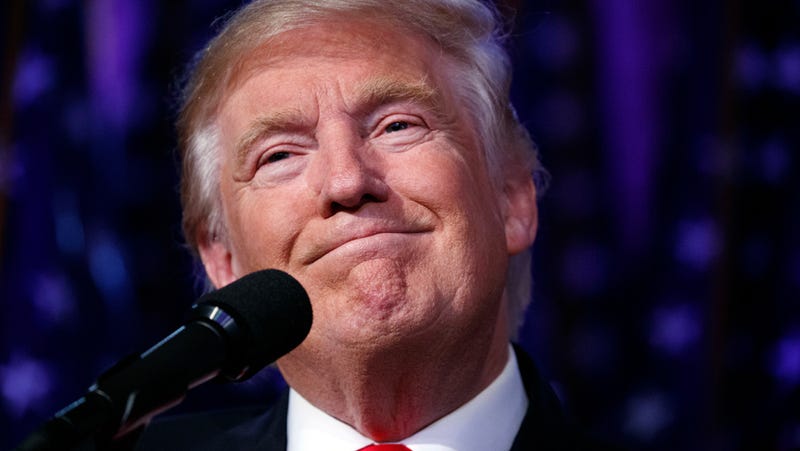
The future of public health in the United States was a hotly contested topic during the 2016 election, with the presidential candidates making bold promises and several important ballot initiatives up for grabs. Here’s how America voted, and what a Trump presidency means to your health.
Donald Trump’s stunning upset victory was clearly the biggest story to come out of the election, but there were other notable developments as well, particularly in the field of healthcare. Last night saw impressive gains for legalized marijuana and doctor assisted death, while a proposal to release genetically modified mosquitoes in Florida is now in doubt.
What a Trump presidency means to other health-related issues, such as the status of medicare and bloated drug prices, remains unclear—though Trump now has the mandate and the power to completely upset various apple carts.
Voters in several states opted to support measures that would permit some use of marijuana. In California and Massachusetts, voters chose to legalize the recreational use of pot. Voters in Florida, North Dakota, and Arkansas approved the use of medical marijuana, while the results in Maine are still too close to call (though it looks good for pot advocates). States that already permit recreational marijuana include Colorado, Washington, Oregon, Alaska, and the District of Columbia. The results from last night means that more than 20 percent of the country’s adult population can now legally spark a doobie.
Voters in Colorado approved a measure allowing terminally ill patients to end their own lives, making it the sixth state in the nation to sanction physician-assisted suicide. Known as the Medical Aid in Dying initiative, it was approved by the vast majority of voters. Similar to a suicide law previously passed in Oregon, the new bill applies to terminally ill patients who have less than six months to live. Patients also need to make three separate requests for life-ending medication, two verbal and one written. In addition to Colorado and Oregon, other states that permit doctor-assisted death include Washington, Vermont, Montana, and California.
In California, voters considered a law, known as the Drug Price Relief Act, that would have placed a cap on prescription drug prices for certain buyers (potentially forcing some pharmaceutical companies to drop their prices). The final vote is not yet official, but it doesn’t look good for this proposal. Had it passed, the bill would have placed a limit on how much California could spend on the prescription drugs it purchases through programs such as Medicaid or insurance plans for state employees. Pharmaceutical companies poured $109 million on ads in an effort to dissuade voters from saying yes.
Voters in Florida expressed uncertainty about a proposed field trial to release bioengineered mosquitoes into the environment. These genetically modified mosquitoes would be able to thwart the spread of diseases like Zika, dengue, and chikungunya, but critics worry about unanticipated negative effects on the environment and public health. Voters in Key Haven rejected the idea, while residents of Monroe County approved it. This result may prevent the project from proceeding in Key Haven, but the results of the referendums are nonbinding. Board members of the Florida Keys Mosquito Control District have a final say on the matter, but given the results of the public vote, it’s not clear how they’ll proceed.
In regards to the future of US healthcare, it’s difficult to know exactly what Trump will do to reshape the system. Trump could try to abolish or roll back Obama’s Affordable Care Act; this is now conceivable given that Republicans have control over both the House and Senate. It’s quite possible that Trump will hand off the responsibility to House Speaker Paul Ryan, who could help craft a new system. That said, there’s considerable disagreement among Republicans over issues such as Medicare restructuring and how to make health insurance more affordable. This is going to be a tricky area for conservatives, who may face a political backlash should 20 million Americans suddenly lose coverage.
Congress has also been working on a bill that would accelerate the approval of drugs and devices by the Food and Drug Administration (a bill that Democrats also supported). This will come as a welcome reform, as the FDA is often accused of taking its sweet time with its approvals.
Another thorny issue is the problem of rapidly rising prescription drug costs (Epipens and price-gouger Martin Shkreli come to mind). Like Hillary Clinton, Trump supports the idea of allowing Medicare to negotiate prices. He also supports price transparency for the entire health care system, and allowing consumers to buy lower-cost drugs from foreign countries. But Republican congressional leaders aren’t on board—and neither are pharmaceutical companies. A potential battle is brewing between Trump and Big Pharma, and it’s not clear who’ll win, or if Trump will even make this a priority.On the issue of the ongoing opioid epidemic and substance abuse, Trump’s campaign promises are unlikely to address the direness of the situation. Trump said he’ll build a wall on the Mexican border “to stop the flow of opioids,” which he says is the “source” of America’s opioid problem. As a solution, this is a non-starter—and that’s bad news for the two million Americans addicted to opioids, such as heroin, morphine, and prescription pain relievers.
[Source:-Gizmodo]




